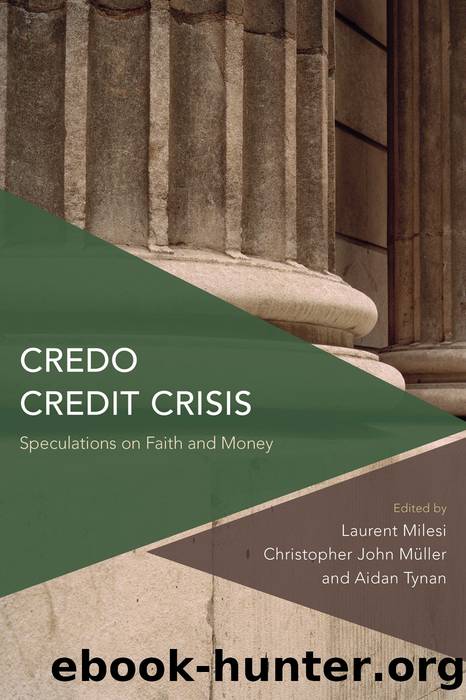Credo Credit Crisis by Laurent Milesi

Author:Laurent Milesi
Language: eng
Format: epub
ISBN: 9781783483822
Publisher: National Book Network International
MAMMONâS POWER AS DEBT: MONEY, AFFECT, POWER
One way to understand the power of Mammon as the value of values is to focus on debt. Focusing on debt as a means of understanding the ways in which Mammon requires what we could call religious devotion establishes an immediate link between it and the Christian theological tradition. Nietzsche, it is well known, traced morality and its component notions, such as freedom, responsibility and guilt, to the various relationships between creditors and debtors. Indeed, the contractual substrate of human relationality, which locates moral sensibility in the mundane activities of exchange and the violence that accompanies them, remains marked linguistically, in the lexical relationship between âguiltâ and âdebtâ. âHave these genealogists of morals had even the remotest suspicion that, for example, the major moral concept Schuld [guilt] has its origin in the very material concept Schulden [debts]â, he asks rhetorically in the Second Essay of On the Genealogy of Morals.15 Nietzsche did not attribute the material origin of âbad conscienceâ as such to Christianity, but he does argue that Christianity capitalizes on it in a specific way. âThe advent of the Christian God, as the maximum god attained so farâ, he writes, âwas therefore accompanied by the feeling of guilty indebtedness on earthâ (GM § 20). On the one hand, Christianity interprets normal human behaviour, which Nietzsche associates with animal instincts, in terms of self-denial and guilt. Christianity, that is, places human beings vis-à -vis the seemingly inescapable judgement of God. On the other hand, Christianity simultaneously offers salvation from this very condition, through Godâs sacrifice of Godself, as a means of redeeming the unredeemable. This is Christianityâs âstroke of geniusâ, Nietzsche writes: âGod himself sacrifices himself for the guilt of mankind, God himself makes payment to himself, God as the only being who can redeem man from what has become unredeemable for man himself â the creditor sacrifices himself for his debtor, out of love (can one credit that?), out of love for his debtor! â â (GM § 21).
The offer of redemption, however, does not necessarily erase the general sense of indebtedness on which Christianity capitalizes. Redemption is, of course, dialectically related to sin, meaning that both have to remain in place for Christianity to function. The actual release of sin qua debt would, ironically, also get rid of the need for salvation, which would erase the very conditions that create the possibility of Christianity in the first place. It is in this sense that Christianity creates what it redeems and, as Gilles Deleuze notes in his reading of Nietzsche on this point, represents a âdeepening of debtâ.16 For instance, this is why Anselm, who can be credited with systematizing the notion of sin as debt in the Western theological tradition, still conceives of the result of satisfaction in terms of debt. Although, on Anselmâs reading, the God-man erases the indebtedness of sin through his satisfaction of Godâs violated honour, human beings still owe God a post-hoc âdebt of gratitudeâ, on top of
Download
This site does not store any files on its server. We only index and link to content provided by other sites. Please contact the content providers to delete copyright contents if any and email us, we'll remove relevant links or contents immediately.
| Budgeting & Money Management | College & Education Costs |
| Credit Ratings & Repair | Retirement Planning |
The Compound Effect by Darren Hardy(8965)
Tools of Titans by Timothy Ferriss(8393)
Nudge - Improving Decisions about Health, Wealth, and Happiness by Thaler Sunstein(7706)
Win Bigly by Scott Adams(7194)
Deep Work by Cal Newport(7082)
Rich Dad Poor Dad by Robert T. Kiyosaki(6632)
Principles: Life and Work by Ray Dalio(6445)
Pioneering Portfolio Management by David F. Swensen(6300)
Digital Minimalism by Cal Newport;(5764)
The Barefoot Investor by Scott Pape(5745)
Grit by Angela Duckworth(5614)
The Slight Edge by Jeff Olson(5417)
Discipline Equals Freedom by Jocko Willink(5389)
The Motivation Myth by Jeff Haden(5212)
You Are a Badass at Making Money by Jen Sincero(4929)
The Four Tendencies by Gretchen Rubin(4600)
Eat That Frog! by Brian Tracy(4535)
The Confidence Code by Katty Kay(4260)
Bullshit Jobs by David Graeber(4190)
